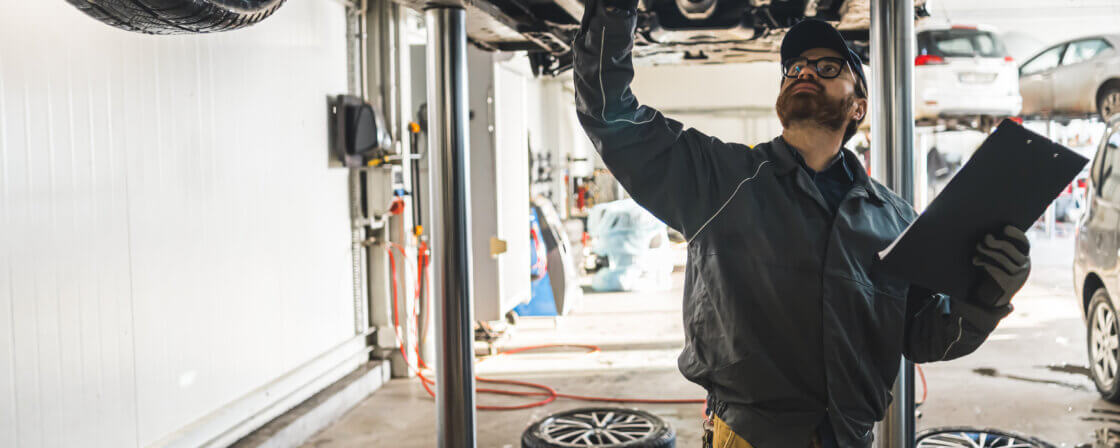How is the STK performed?
A roadworthiness test (STK) is compulsory for all registered vehicles operated on the road. Its purpose is to check that the vehicle is safe and fit for use, as stipulated by the Act on the Conditions of Operation of Vehicles on Roads.
The Ordinance on Technical Inspections of Vehicles specifies exactly what is checked at the STK. The whole process usually takes place in several successive stages:
Registration check
The first step is the registration check, which is intended to verify that the vehicle corresponds to the data entered in the register. The technician will check the VIN (vehicle identification number – check that it matches the information on the registration certificate), the number plate and registration mark, including its legibility and correct attachment, and the information on the plates and labels themselves, which indicate the basic technical parameters of the car.
This section is necessary, for example, when the vehicle is being reassigned, imported from abroad or when the data in the register is changed. If any of the data does not match or is illegible, the vehicle will not pass the inspection.
Technical inspection
This is followed by the actual technical inspection, which focuses on the functionality and condition of the various parts of the vehicle that are important for safe operation. Among other things, the following are checked:
- The braking system – brake efficiency, balance of braking action at each wheel, condition of brake lines, discs and pads.
- Steering – steering play, condition of fasteners, bearings and seals.
- Chassis and axles – wear, deformation, corrosion of load-bearing parts, as well as the condition of arms, pins and shock absorbers.
- Lighting and signalling – functionality of low and high beam headlights, brake lights, turn signals, fog lights, number plate lights.
- Tyres and wheels – tread depth, even wear, conformity of dimensions with the technical certificate.
- Bodywork and view from the car – the technician will assess the general condition of the bodywork, any corrosion and its effect on safety, the transparency of the windows and the function of the wipers and washer systems.
- Exhaust system – tightness, fit and noise level.
Measurement of emissions
Vehicles with an internal combustion engine must also undergo a separate emissions measurement (SME). This part is usually carried out directly at the MOT station, or at a specialist emissions station if the services are not combined.
During the emissions measurement, the technician checks the fuel system, including leaks and the presence of original components, connects the measuring device to the exhaust system and measures pollutant levels (e.g. CO, CO₂, NOₓ, unburned hydrocarbons). On modern vehicles with OBD system, it will perform a diagnostic of the control unit and evaluate the presence of faults (fault codes).
If the vehicle exceeds the permitted emission limits or shows faults in the system, the result is a failing rating, even if the vehicle is otherwise in perfect condition. Emissions are therefore a separate obstacle to obtaining a positive STK result. If everything is in order, the vehicle will receive a report and an inspection sticker. If defects are found, it depends on their severity, as we write below.
Are you solving a similar problem?
Not sure what you're facing for a lapsed MOT or have another legal problem?
Contact our legal advice service. We can help you resolve fines, administrative proceedings and any disputes with the insurance company. Get legal certainty before the inconvenience catches up with you.
I have a question
- When you order, you know what you will get and how much it will cost.
- We handle everything online or in person at one of our 6 offices.
- We handle 8 out of 10 requests within 2 working days.
- We have specialists for every field of law.
What do I need for the technical inspection?
Prepare the following documents and equipment for the MOT:
- Vehicle registration certificate (technical licence).
- Proof of compulsory liability insurance – you do not need to have it physically, but it must be registered in the system.
- Proof of emission measurement, if required (emissions can also be taken separately at the MOT test).
- Power of attorney if the vehicle is not being driven by the owner.
The vehicle should be clean, unladen and in normal operating condition. If you have a towbar, it must be listed on the registration and fitted with a plug.
How much does an MOT and emissions test cost?
Prices for MOT tests are not fixed by law, but in practice they are usually around CZK 1,000 to 1,600 and a registration check will cost CZK 300 to 500. The price of an MOT depends on the type of vehicle, the region and the specific station. If you have an MOT and emissions test separately, the price may be higher. Combined services tend to be more cost-effective.
When and how often do you have to have a MOT?
The validity of the MOT depends on the type and age of the vehicle:
- New cars: first MOT after 4 years, every 2 years thereafter.
- Used cars: every 2 years.
- Motorcycles and trailers: first MOT after 6 years, every 4 years thereafter (unless the vehicle is in category L over 125cc – there the period is 4+2 years).
The date of the next check can be found on the sticker on the rear number plate. If the registration is expired, the vehicle may not be driven on the road. If you drive it, you can be fined and towed away. If the vehicle changes hands, a registration check is compulsory and the registration must not be expired.
The Act on the Conditions of Operation of Vehicles on Roads also stipulates that roadworthiness must be proven when importing a vehicle from abroad – otherwise it will not be entered in the vehicle register.
Tip for article
Tip: A car parked across two parking spaces, by a fire hydrant, or blocking half the sidewalk are all examples of inconsiderate parking. Find out when you can be ticketed for such parking.
What to do if a fault is detected?
The faults must be rectified and the car must be re-inspected, otherwise it must not be allowed on the road. Defects are rated according to severity:
- A – light: the vehicle passes but repair is recommended,
- B – serious: repair and re-test within 30 days,
- C – dangerous: the vehicle is not roadworthy and must not be driven on the road.
What is the penalty for a failed MOT?
Driving a vehicle with an expired roadworthiness test (MOT) is not just an administrative offence, but an offence that carries quite substantial penalties. If the police stop you at a roadside check and find that your vehicle does not have a valid MOT, you can be fined up to CZK 2,000 on the spot in a so-called block procedure. If the matter is dealt with in administrative proceedings, the fine can rise to CZK 5,000. In addition, the police will add 5 penalty points to the driver’s points system. In some cases, the vehicle registration certificate, i.e. the large technical licence, can also be confiscated. This means that you must not continue driving the car and must have it towed away or arrange other means of transport.
However, insurance is also a big risk. If you cause an accident with a vehicle that does not have a valid MOT, the insurance company may refuse to pay the claim or significantly reduce the compensation. This applies not only to your accident insurance, but also to your compulsory liability insurance – although the insurance company will first pay the victim, it can then recover the amount from you through so-called recourse. In extreme cases, the damages can run into hundreds of thousands or even millions of crowns. So it definitely doesn’t pay to drive without a valid MOT test.
Summary
Every vehicle must have a regular roadworthiness test (STK) to check the vehicle’s roadworthiness and emission limits. The first MOT is due for a new car after 4 years, then every 2 years, motorcycles and trailers after 6 years and then every 4 years. During the inspection, technicians will check the VIN, braking system, steering, chassis, lighting, tires, bodywork, vision, exhaust and emissions. You will need a large MOT, a registered third party insurance policy, proof of emissions if applicable, and a power of attorney if you are not the owner. The price of an MOT test is roughly between CZK 1,000 and CZK 1,600, a registration check costs CZK 300-500 and emissions measurement separately costs around CZK 800-1,200. If the technicians find a fault, depending on its severity, you must either have it repaired (A), pass the MOT test again within 30 days (B) or you must not put the vehicle on the road (C). Driving with a failed MOT car carries a fine of up to CZK 5,000, 5 points and the possibility of having your licence withheld, and the insurance company may refuse to pay in the event of an accident.




